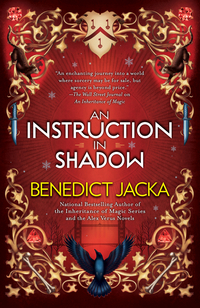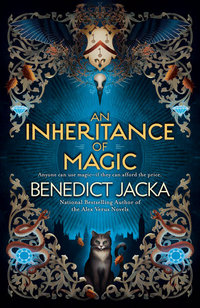 An Instruction in Shadow
An Instruction in Shadow
DETAILS: Series: Stephen Oakwood, #2 Publisher: Ace Books Publication Date: October 15, 2024 Format: Paperback Length: 310 pg. Read Date: December 9-11, 2024

What’s An Instruction in Shadow About?
This picks up mere hours after An Inheritance of Magic, and Stephen is feeling pretty good about himself. His job is going okay, he’s continuing to improve in his magic, he’s got a good lead when it comes to his father’s location—sure, things with his mother weren’t quite what he’d hoped for. But she left the door open to further communication.
And it doesn’t take long for things to start going wrong—but nothing disastrous.
The best way to summarize this book is to say that: everything from the last book continues along the same trajectory, but gets harder. This means nothing if you haven’t read that book, but you really should (at the very least, go check out my post about it). Among the ways that happens—a cult (or cult-like group) tries to recruit him, an assassin makes an (almost successful) attempt on his life, he gets suspended from work, and he runs afoul of a group of Russian criminals.
Worst of all, Stephen gets in deeper with his mother’s family.
The World and Its Magic System
We don’t learn much more about sigl work or Wells—we see more examples of what we’ve already seen at work, but that’s about it. Alright, we get to see what medical sigls can do, so that’s new.
What we get more of-—and it’s just the tip of the iceberg, I’m sure–is insight into the families and companies that run the sigl economy and Well markets. If there are ethics governing them in any way, shape, or form, Stephen hasn’t shown them to us. It’s all about power, manipulation, and things that happen under the table and behind the scenes. It’s both unthinkable that things operate in this fashion in the 21st century—and somehow the part of the book that seems the least fictional or fantastic.
Much of this comes from an info drop or two—but they’re worked into the narrative perfectly. They’re neither disruptive to the overall story nor are they clunky exposition.
So, what did I think about An Instruction in Shadow?
Let me start with this: I would happily read books 3 and 4 in this series in the next couple of months, and still be eager for more. The more we see about this world—and the more questions we have raise, the more I want to learn and see.
Am I a little worried about the arc that Jacka is suggesting for Stephen? Yes. Am I also almost certain that the arc won’t go the way it looks, and that there’s nothing to worry about? Yes.
I really just want more of it—-I am not certain that I care too much about the whole “where’s Stephen’s dad” part of the overall story, but I’m pretty sure that I don’t need to, because the series has been inevitably moving in that direction since the beginning, and when the time comes, I’ll get invested.
But Jacka has got me sitting on the edge of my seat when it comes to everything else. I want to see more of how this economy works—on the legitimate side, the illegitimate side, and then the murky overlap. I want to understand how Stephen is going to operate and keep his head above water in it. He’s not just a MacGuffin, but he kind of feels that way right now.
I’m feeling really inarticulate when it comes to this series—and this installment in particular. Everything I said about the first one is still true. We really just got more of what he’d already given, so my position and thoughts are pretty much the same, too.
I did think that despite his struggles and the aforementioned almost successful assassination, things went a little too easy for Stephen this time. I’d have liked a failure or two. Or at least another draw or two. Even when things were at their hardest for him in this book, he found a way to turn the oncoming defeat into a victory. I typically really appreciate that kind of thing (obviously), but I had very little doubt each time that Stephen was going to come out on top. I just want a little more suspense and doubt on that front. But this wasn’t a major distraction or detraction—it’d just be good for Stephen’s life to be seen as difficult as he sees it.
Also, one of the better parts of An Inheritance of Magic was watching the trial and error Stephen went through—it was very effective in terms of character development and showing us the way sigls work. Give me more of that and I’m happy.
Again—I thoroughly enjoyed this book and am eager to read more. I just wanted it to be a teeny bit better.
If you’re into inventive UF, there’s no better time than now to jump on this series—I think you’ll be as invested in getting more as I am.

This post contains an affiliate link. If you purchase from it, I will get a small commission at no additional cost to you. As always, the opinions expressed are my own.
![]()




